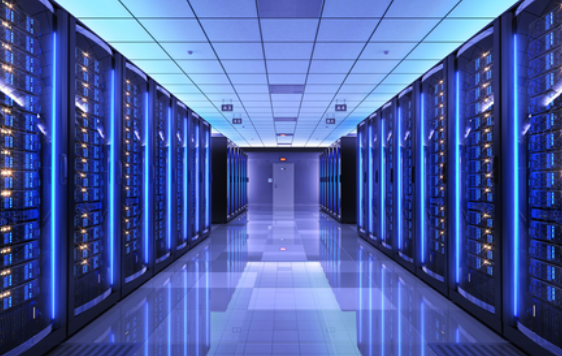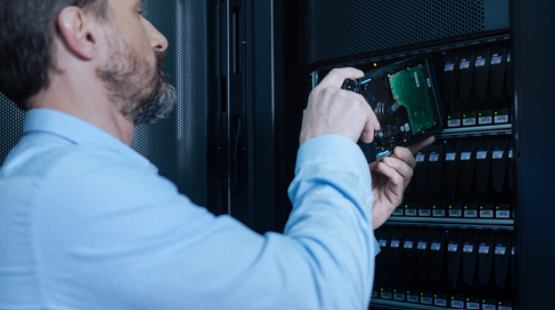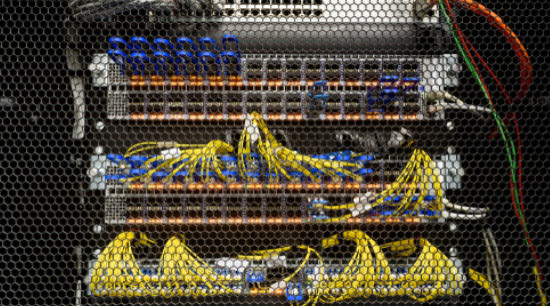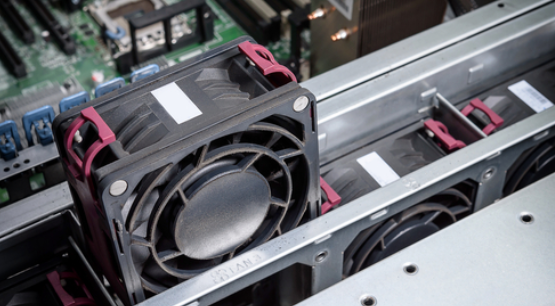Colocation
A colocation center (also spelled co-location, or colo) or “carrier hotel,” is a data center facility in which a business can rent space for servers and other computing hardware. Many colocation providers sell to a wide range of customers, ranging from large enterprises to small companies. Typically, a colo provides the building, cooling, power, bandwidth, and physical security while the customer provides servers and storage. Customers retain control over the design and usage of their equipment, but daily management of the data center and facility is overseen by the multi-tenant colocation provider.

Let’s Unpack That
The term colocation refers to several aspects of a data center. First, the term references the fact that servers and other equipment from many different companies are ‘co-located’ in one data center. The hardware is usually owned by the companies themselves and simply housed (and sometimes maintained) by the data center staff. It also refers to the concept that a company can have their equipment located in multiple places. They may have servers, for example, in three or four different colocation data centers. This is important for companies that have large geographic footprints and want to ensure their computer systems are located near their physical offices.
Cabinets – A cabinet is a locking unit that holds a server rack. In a multi-tenant data center, servers within cabinets share raised-floor space with other tenants, in addition to sharing power and a cooling infrastructure.
Cages – A cage is dedicated server space within a traditional raised-floor data center; it is surrounded by mesh walls and entered through a locking door. Cages share power and a cooling infrastructure with other data center tenants.
Suites – A suite is a dedicated, private server space within a traditional raised-floor data center; it is fully enclosed by solid partitions and entered through a locking door. Suites may share power and a cooling infrastructure with other data center tenants, or have these resources provided on a dedicated basis.
Modules – Data center modules are purpose-engineered modules and components that offer scalable data center capacity. They typically use standardized components, which make them easy to add, integrate, or retrofit into existing data centers to fit a customer’s needs. In a colocation environment, the data center module is a data center within a data center, with its own steel walls and security protocol, and its own cooling and power infrastructure.
Why Choose Colocation?
For companies, or even individuals, who want to use colocation data center services, there are many great benefits to enjoy. The following are some of the most significant to be aware of when deciding if this type of service is a good option.
Lower Costs – When comparing the costs of a colocation data center with the option of building your own facility, the choice is obvious. Unless your equipment requires a huge amount of room, costs are far lower when using the colocation option.
Fewer Technical Staff – You don’t need to worry about things like running cables, managing power, installing equipment, or any other technical processes. In many cases, the colocation data center will even be able to replace components or perform other tasks as needed. This means you don’t need to employ a large IT staff to handle this work.
Exceptional Reliability – Colocation data centers are typically built with the highest specifications for redundancy. This includes backup power generators, excellent physical security, multiple network connections through several telcos, and much more.
Geographic Location – You can choose the location of your data center so that it is near your users.
Predictable Expenses – The costs associated with a colocation data center will be very predictable. You can often sign contracts that last one or more years, so you can know exactly how to budget your IT needs.
Easy Scalability – When your business is growing, new servers or other equipment can be quickly and easily added to the facility. When your equipment is in a small local data center or server closet it can be much more difficult to expand.

Why Work With Us?

Although colocation seems very straightforward, the reality is that there are multiple factors to consider when selecting the right partner to house your mission critical business applications.
- Is the data center location geographically dispersed?
- Are there environmental concerns that I should be aware of in that region?
- What tier data center do I need?
- Will the colocation partner meet my security compliance requirements?
- Will I need help procuring and installing equipment?
- Do they provide other services if I choose to move the cloud?
We can help you identify your needs, then research which colocation partners would be appropriate to speak to and get quotes from. From there we can also help with the selection process.
Working with an independent consultant allows us to analyze your needs and source the best solution provider(s) that meet requirements and exceed expectations. This is done agnostically, letting you focus on the project at hand without being tied down by endless supplier discussions.
Is Colocation Right for My Organization?
Today’s organizations are finding it more convenient to move their critical assets into a more secure and resilient environment. This helps with uptime, performance, and disaster recovery.
When asking yourself if colocation is right for your organization, consider the following:
- Are you looking for a secure environment to relocate your application infrastructure?
- What, if any, compliances does your organization need to adhere to?
- Do you need geographic redundancy for your applications? If so, what are acceptable regions to consider?
- How much space, power, and types of network connectivity will be required?
- What, if any, existing carriers do you need connectivity within a new facility?

Things to Consider

When selecting a colocation facility, keep in mind the following factors:
- Geographic Locations – natural disasters
- Regions that have less expensive power than others
- Subsidized power
- Power & Cooling capabilities
A number of colocation companies have adopted the modular approach to build their data centers to better match customer demand. This allows customers to buy a data center as a service, paying only for what they consume.
If you really are not using any server-based technology, then Colocation might not be a fit for your organization. However, you will still need a BCDR (Business Continuity Disaster Recovery) strategy, which does reside in one or several colocation/data center facilities, even when cloud-based.




